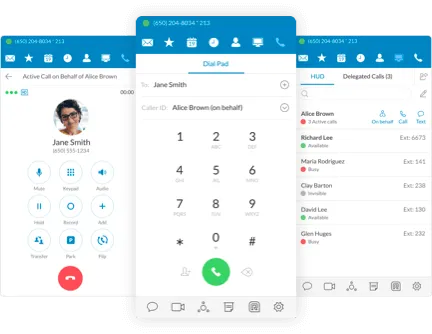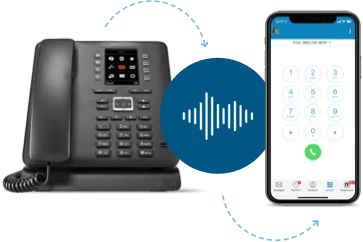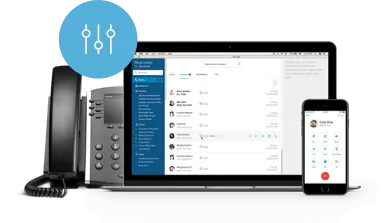

What is fixed VoIP?
With the increased use of the internet, it’s safe to say that most, if not all, modern businesses have used VoIP (Voice over Internet Protocol) at some point or the other. That’s because anyone can just download a VoIP app, install it on their device, sign up, and start using it. This is how non-fixed VoIP works (more on this later).
Fixed VoIP is the other, more secure, and feature-rich type of VoIP service. Much like a traditional landline number, a VoIP number is “fixed” to a specific address. You could only get one if there’s a location associated with it. Sure, that changed a bit when smartphones arrived, but even then, you still need to give a physical address to link your account.
Fixed VoIP phone number
VoIP offers a ton of benefits to businesses of all types and sizes. For this reason, the decision to switch came easy for many, while others have been using it since their inception. As the user, you are faced with the decision of choosing between fixed and non-fixed VoIP. Which one is right for your business? Let’s first put the focus on the benefits of fixed VoIP.
Top-tier security
Following stringent safety measures and security protocols, VoIP providers encrypt the network that transmits your calls. This way, you won’t have to worry about anyone spying on your conversations.
Some companies perform the job better than others. RingCentral, for instance, has brought VoIP security to another level, making sure your calls are completely secure and the chance of your number getting stolen is little to none. But like any hawk-eyed business professional, you should always watch out for threats like theft of service, denial-of-service (DoS) attacks, malware, and call interception.
If you fear that a wayward employee could try to sabotage your company and use your number for fraudulent activities, find comfort in the fact that with fixed VoIP, the address that your phone number is associated with can be traced to the phone line. Knowing that this line can easily be tracked down should get fraudsters to think twice about executing any form of dishonest practice.
Access to emergency services
Since VoIP uses the internet, emergency calls can become a challenge. Fixed VoIP still makes use of internet telephony, but since the number is linked to a location, there’s a way for your service to support emergency calls.
Here’s how it typically works: When you dial 911, your call is sent to the emergency response center, which will then transmit your exact address to emergency responders. A delay in emergency assistance is the last thing you want, so it’s important that you register an accurate location. If you need to move to another location, be sure to update your service provider immediately.
The problem is not all VoIP providers offer emergency 911 calling. It would be best to clear this out with the provider before signing up. You don’t want to register for an internet phone service only to find out later on that it doesn’t fully address your concerns, especially for something as critical as emergency calls.
Thankfully, there are companies like RingCentral that allow users with a digital line to access the basic 911 or enhanced 911 (E911) service to make sure you get help when accidents happen.
Expanded features
Signing up for fixed VoIP means investing in a reliable communications system with a variety of tools that help augment business productivity. Depending on the provider you choose, you can have access to all the basic and sophisticated features your business needs, such as audio and video conferencing, business SMS and MMS, virtual faxing, and more.
With fixed VoIP, you can opt to link all your numbers to a specific address, hence it’s ideal for businesses, especially those with multiple phone lines. Using this service allows you to create a complex communications system fit for your business.
The people at RingCentral would be happy to discuss with you all the benefits your business can get from fixed VoIP. If you are looking for the perfect communications system, they can guide you every step of the way.

Non-fixed VoIP phone number
Practically any individual with access to the internet can use non-fixed VoIP. As the term implies, a non-fixed VoIP number doesn’t need to be associated with an address, so it’s easy for a caller to register a phone number from any place outside of their residence.

Easily accessible
As with the best fixed VoIP solutions, setting up a non-fixed VoIP system doesn’t take much out of your time and budget. You don’t even have to purchase additional hardware. As long as you have an internet-enabled device, you can download and install a non-fixed VoIP app and use it as needed.
Once installed, all you need is a simple email signup to get started. You can also deactivate any time you wish—this is where the question of authenticity arises. Since it’s easily obtainable and “disposable,” a non-fixed VoIP number doesn’t lend much authenticity to your business. You don’t want potential customers to question your legitimacy, right?

Convenient and easy to use
The features and functionalities of non-fixed VoIP should address the basic need of most VoIP users, which is low-cost calling (and some form of messaging). Simply download the non-fixed VoIP app, get a phone number, and you’re ready to go.
You don’t really need a truly business-friendly phone network to get up and running. But for actual business communications, non-fixed VoIP lacks the security and advanced features that most organizations require to adapt it to their operations.
Without as much professional options as fixed VoIP, non-fixed VoIP is generally better for personal use. Sure, it’s good for global communication, but there are also fixed VoIP providers that deliver quality international calling services without the high price tag. In this case, RingCentral is your best bet.
RingCentral takes pride in having an extensive, worldwide coverage to prepare your business for global expansion or keep you globally competitive. You can connect your international offices, expand your global ties, and establish presence in your places of business here and abroad.
Common VoIP problems and how to fix them
No matter what type of service you choose, there’s always a chance that you’ll encounter issues with your phone or network. Some of them can get terribly frustrating and can affect not only your business operations but also the way you handle customer relationships. Here are some common VoIP issues and what you can do to fix them:
Choppy audio
The stuttering sound of the other person’s voice is a deal-breaker. Imagine one of your customer service reps talking to an irate client. Your staff tries in earnest to calm them down but the choppy audio is not helping it. At this point, any attempt to calm the furious caller down could prove futile.
Instead of winning angry customers back, you lose them, and you lose them bad—you don’t underestimate the power of a dissatisfied customer venting their frustrations on social media.
But what causes choppy audio? Most often, it indicates inadequate bandwidth due to internet congestion. You can try turning off other devices connected to your network or close apps that consume a lot of bandwidth. You can also check your router settings and make sure the quality of service (QoS) prioritizes VoIP traffic over all other data.
Jitter
Have you ever experienced staticky or crackly sounds in your calls? That’s what is referred to as jitter, and it happens in connectionless or packet-switched networks. Your voices can still be heard as normal but they are drowned out by the noise.
If this is a continuing issue, it’s highly likely that QoS is the culprit. It’s also possible that the echoes are caused by the placement of your VoIP hardware. Be sure your phone, computer, router, power strip, and other equipment aren’t placed too close to each other as this triggers electromagnetic interference.
Latency (audio delay)
Sometimes the time it takes for a person’s voice to reach the listener’s ear is longer than usual. The delay in audio produces an echo or overlapping noise. You’ll either hear your own voice or the other person’s voice bouncing back through the audio. And when you start talking, you may come off as interrupting the other person.
Keep in mind that voice calls are real-time communication, so the slightest delay in audio transmission is noticeable. It gets even worse when video conferencing as the audio could get out of sync with the video—what a way to delay project meetings.
Once again, adjusting your QoS to prioritize VoIP traffic is the best thing to do. Done right, you won’t experience latency issues again.
Dropped calls
You’ve probably experienced it yourself—you’re on the phone with someone and have been talking for a while before you realize there is no one on the other line. Sure, you can just call the other person again, but not without getting frustrated. If it gets too frequent, it can damage your operations.
Apart from the wrong prioritization of QoS, dropped calls can also be attributed to insufficient bandwidth. This is especially the case if dropped calls are frequent during the busiest times in your office.
How do you plan to deploy VoIP?
It’s no surprise that more and more businesses are turning to VoIP for their communications system. There are those that prefer to house and manage their own system (on-premise VOIP systems) and there are those that elect to delegate the task to a third-party provider (hosted VoIP phone system). Let’s see which one is better in terms of the following criteria:

Cost
On-premise VoIP requires a higher setup cost, and more often than not, this translates to lower monthly expenses. But then if you think of all the spends and hassles of maintaining your own system, you’ll probably think you’re better off with hosted VoIP, especially in the long run.
For one, a hosted VoIP phone system requires a lower installation cost. You also don’t need to spend on upgrades, maintenance, and repairs because your provider has you covered. Those issues on call quality mentioned earlier? Your provider handles them as well.
Costs could soar to unimaginable heights if you decide to do everything yourself. Some tasks also entail a level of expertise your existing staff may not possess. With hosted VoIP, you only pay a fixed monthly fee and it covers all upgrades and expert technician repair care.

Security
Because on-premise VoIP systems give you better control over your infrastructure, it’s easy to think that security wouldn’t be much of a problem. This could be true if you have vast IT resources to back it up, although many large businesses these days prefer to leave the big task of managing security to third-party experts.
By doing so, they can focus on other important aspects of their business. As to which provider offers the highest level of security, the choice is easy. RingCentral is a company with extensive experience in identifying vulnerabilities, minimizing areas of attack, and safeguarding all entry points.

Scalability
As your business grows and attracts more customers, you’ll notice that things start to get more complex. The technology you initially relied on no longer works as you add more phones and users. Growth could also mean you need access to more features that would support your increasing needs and new business initiatives.
Obviously, hosted VoIP is the better option. When you have a knowledgeable team at your beck and call to add or remove features and enact any future change, you’ll have peace of mind knowing things are well managed.
VoIP’s growing popularity among businesses is a testament to its effectiveness, and the fact that it’s constantly improving could only translate to an increasing market demand. It’s cost-effective, flexible, and multifunctional—just what every modern business needs for a robust business communications solution.
Look into RingCentral for a VoIP phone system that you can use and manage from anywhere using any device. You’d be surprised at how reasonably priced RingCentral’s packages are, given all the features they provide.